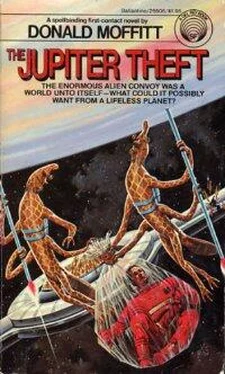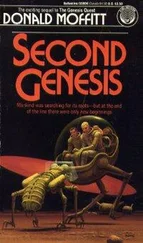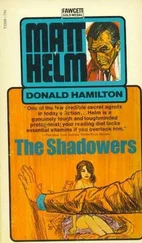The new astronomer came aboard later that day. His name was Ruiz, and he looked a little old for space, but he handled himself well in no-g. They hadn’t subjected him to the indignity of a rescue ball; he looked too brittle for that, and he was a VIP. He was ferried over from Eurostation in a small passenger gig with an assistant, a grave dark-eyed little girl named Maybury who somehow looked familiar.
She saw Jameson looking at her and said at once, “It was the Eurostation-Texas shuttle a couple of weeks ago, Commander. We were seatmates.”
“Of course. You were wearing a poncho, and you were on your way to Nevada.” He shook hands with the two of them. Ruiz had the knack, but the girl’s feet lost contact, and Jameson had to discreetly plant her again.
Boyle and Captain Hsieh were off somewhere for a meeting with the fusion engineers, making preparations for engine start-up. After Yeh Fei and Tu Juechen had stiffly completed their share of the formalities, and Kay Thorwald had excused herself and disappeared, Jameson volunteered to get Ruiz and Maybury settled.
“Just stay close to a wall and don’t move too abruptly and you’ll be all right,” he said. “There are cords strung along the corridors, and those socks they gave you will stick to the fuzzy strips along the floors. If you do find yourself floating in the center of a compartment, out of reach, don’t get panicky. Air currents will eventually send you drifting up against a surface.”
“Or some friendly passerby will bounce himself off of us, eh?” Ruiz said.
Jameson smiled appreciatively. “Oh, you’ve spent some time in free fall, then? I know you both were stationed on the Moon, but…”
“I put in almost two years at the old L-5 orbital observatory when I was a young man,” Ruiz said. “They spun the living quarters, but I spent my working days in the cage. Big warehouse of a place. Even a small fraction of a g, of course, would have made the big mirror sag out of all usefulness. It was made by stretching a film of molten Merlon across a hundred-meter hoop in the first place, and it was less than a millimeter thick at the center.”
“How about you, Mizz Maybury?” Jameson said. “Have you spent much time in free fall?”
“No,” she responded. “That is, except in the Moon shuttle. But of course you spend most of your time belted in your seat, and they have the flight attendants taking care of you and everything.”
“You’re doing very well,” Jameson said charitably. “At any rate, you’ll only have to put up with it for a few more days. We’ll be putting on spin as soon as we’re sure the new modules are fastened securely. After that, we’ll have two thirds of a g all the way—except for a few hours during engine start-up, as a safety precaution.”
At that point they all had to crowd themselves against the corridor wall as one of Grogan’s angels came sailing toward them, halfway-between floor and ceiling, a bundle of plastic struts cradled in his hairy forearms.
“Sorry, Commander,” he said as he shot past; Jameson had to duck the end of a strut. They turned to watch the man. His line of flight was a chord that intersected the shallow upward curve of the corridor, and at the last possible moment, when his chin seemed about to scrape the floor, he gave an expert push of one foot, like the flick of a goldfish’s tail, and launched himself on a new chord toward the invisible ceiling beyond.
“I’ll never be able to do that,” Maybury said ruefully.
“He shouldn’t be doing it either,” Jameson said. “It’s against the safety rules.”
“How long will we be accelerating?” Ruiz said as they continued walking.
“A bit over two weeks,” Jameson said. “By that time we’ll have reached about a hundred and sixty kilometers per second. Then we coast, for four months, turn the ship’s long axis around, and decelerate for another couple of weeks. We’ll reach Jupiter in five months, thanks to the new boron engine.”
“And you’re going to spin the ship during acceleration and deceleration? Won’t that complicate our sense of up and down?”
“Not enough to notice,” Jameson said. “We’ll only be accelerating at about a hundredth of a g—nine point eight centimeters per second per second. But we’ll be spinning at two-thirds of a g at right angles to the direction of thrust. That’s a distortion factor of less than one to sixty-six. The floor will seem to tilt slightly, of course, but it’ll be almost imperceptible.” He slapped the corridor wall. “About enough of a tilt to start a marble rolling toward the aft bulkhead here, if you gave it a helpful push.”
“I got a good view of the ship through the porthole on the way over,” Maybury said hesitantly. “I didn’t think it would be so big. It was beautiful—like a giant toy top, with that long broomstick sticking through the center of the circle.”
“That’s a good way to think of it, except that the ‘broomstick’ doesn’t spin. It’s more of an axle than a shaft. What we’ve really got is a space station revolving round a rocket. It’s the only sensible design for very long trips. I wouldn’t like to be spinning round a short radius, as they do in those glorified barrels they send to Mars, or try to apply course corrections to two weights tied to each other by a long cord.”
“Commander,” Ruiz said abruptly, “I’d like to see Dr. Pierce first and get it over with.”
“All right,” Jameson said. “I thought you might want to put it off till you’d had a chance to catch your breath.”
“How’s he taking it?”
“I suppose,” Jameson said carefully, “he’s wondering why he’s being superseded as chief astronomer just a few days before the start of the expedition.”
“I suppose you all are,” Ruiz said dryly. “And why the powers that be have grafted a nuclear strike force onto what started out as a purely scientific mission.”
“They explained it to us at the briefing yesterday,” Jameson said in a neutral tone. “The nukes are just a precaution. Like giving an archeologist a pistol to protect himself against snakes. But those thirty-mile-long artifacts from Cygnus have been scrubbed by radiation for thousands—maybe millions—of years, so there aren’t going to be any snakes. Or so they say.”
“Except in this case the archeologist’s pistol has a mind of its own, eh? I don’t suppose your Captain Boyle likes having an officer on board who isn’t under his orders. To say nothing of the Chinese bomb crew.”
Jameson said nothing.
Ruiz sighed. “How do you feel about the bomb crews, Commander?”
“As long as they don’t interfere in the running of the ship or our assigned missions, it’s none of my concern.”
“Prudently spoken, Commander. But I’m going to interfere in your assignments, aren’t I?”
“That’s different.”
“Can you modify your Callisto lander for the Cygnus planet, Commander?” Ruiz asked.
“No. The gravitational field’s too powerful—about one Earth gravity, I’m told. We could get down, but we’d never get up again. We’ll have to study it from close orbit. But we can try a landing on its moon.”
“You can crash an automated probe or two on the planet’s surface, though, can’t you?”
“We can do better than that. We can soft-land some of the little rovers. We’ve got a few to spare. A planet from outside the solar system’s a hell of a lot more interesting than Ganymede or Europa.”
“I’m glad you feel that way, Commander.”
Jameson permitted himself to show a little emotion.
“Hell, man, this is my chance! I never thought it would come in my lifetime!”
Ruiz looked pleased. “I suppose not. There’ll be Centauri probes with the new boron engine, but we’ll be waiting the better part of a thousand years to get any answers from them. Our Cygnus visitor’s been masked by radiation from Cygnus X-1 for more than eighty years that we know of. It has to be from a hundred light-years’ distance at the very least.”
Читать дальше












